|
|
|
Sort Order |
|
|
|
Items / Page
|
|
|
|
|
|
|
| Srl | Item |
| 1 |
ID:
058759
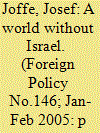

|
|
|
|
|
| Publication |
Jan-Feb 2005.
|
|
|
|
|
|
|
|
|
|
|
|
|
|
|
|
| 2 |
ID:
106052
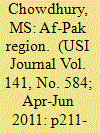

|
|
|
| 3 |
ID:
082071
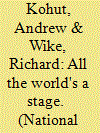

|
|
|
| 4 |
ID:
130242
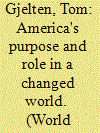

|
|
|
|
|
| Publication |
2014.
|
| Summary/Abstract |
The presidencies of George W. Bush and Barack Obama suggest what doesn't work in efforts to promote US influence in the world. By ordering an ill-conceived invasion of Iraq, Bush alienated US allies. His policies of secretly imprisoning Islamist militants and then subjecting them to "enhanced" interrogation and indefinite detention at Guantánamo struck Muslims everywhere as evidence of a war on Islam. Barack Obama, elected as the most explicitly anti-war president since Woodrow Wilson, came into office determined to undo the international damage done by his predecessor. "The walls between old allies on either side of the Atlantic cannot stand," Obama said in Berlin in 2008, and a year later, speaking in Cairo, he promised "a new beginning" with the Muslim world, with relations "based upon mutual interest and mutual respect." As promised, he withdrew US combat troops from Iraq. By 2013, however, Obama had fared little better than Bush in his global outreach. According to the Pew Research Center, support for the United States in Egypt, Jordan, Lebanon, and Pakistan was actually lower than it had been in the last year of the Bush administration. In Europe, the US favorability rating was higher than it was under Bush, but it had fallen steadily in the years since Obama took office, and it remained far below where it stood in 2000. One possible lesson from these years is that presidential personalities, speeches on foreign stages, and the changing international opinions of US policies matter less than we might think. Perhaps the most reliable measure of America's standing in the world is how appealing the country is to all those who are considering migration. Since 2007, Gallup surveys in more than one hundred and fifty countries have shown that the United States is far and away the number one favored destination. The most recent survey projected that one hundred and thirty-eight million people worldwide would like to move permanently to the United States, more than three times the number who would choose the United Kingdom, the second most favored destination. Those numbers show the United States still represents opportunity and promise to people around the world, and it is clearly in the US global interest to maintain that reputation.
|
|
|
|
|
|
|
|
|
|
|
|
|
|
|
|
| 5 |
ID:
130243
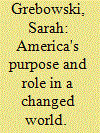

|
|
|
|
|
| Publication |
2014.
|
| Summary/Abstract |
I'll never forget my brief and ill-received show of American patriotism as a young expatriate in Beirut. It was the summer of 2010, and the city was teeming with convoys of Lebanese youth honking and waving flags to celebrate their favorite teams' victories in the World Cup. After an exciting win by the US, I joined a group of Americans in a street celebration. But cruising down the main thoroughfare of West Beirut, our procession of stars and stripes was met with disapproving looks. The image that remains with me to this day is that of an older man standing silently with his shoe in his hand. The tattered sole was pointed directly at us, an expression of disrespect in Muslim culture. We recognized the gesture's meaning only because a similar shoe had been thrown at the American president's head a year earlier.
Today's generation of young Americans, known as the millennials, has come of age at a time when America has been humbled on the world stage. Many of them have traveled extensively at a young age and experienced this diminished reputation firsthand. Their parents and grandparents believe that America has been a remarkable force for good in the world and that the country should not lose sight of its responsibility to shape events globally because of mistakes made in the last decade. But millennials seem more fixed on the limits of American power and disenchanted with ideas of American exceptionalism.
Because of these reservations, the millennial generation is often described as declinist or isolationist. I disagree. Young Americans care more than any other age group about what happens beyond our borders. Millennials tend toward multilateralism and the cautious use of force, and perhaps would be more selective in committing US resources overseas. But far from an abdication of global leadership, this prudence may prove to be the silver lining to millennials' crisis of confidence in America's role as, in President Obama's words, "not just a place on a map, but the light to the world."
|
|
|
|
|
|
|
|
|
|
|
|
|
|
|
|
| 6 |
ID:
023010
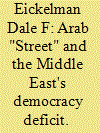

|
|
|
|
|
| Publication |
Autumn 2002.
|
| Description |
39-48
|
|
|
|
|
|
|
|
|
|
|
|
|
|
|
|
| 7 |
ID:
133819
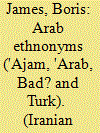

|
|
|
|
|
| Publication |
2014.
|
| Summary/Abstract |
In general terms, the history of the Kurds in the medieval period-or at least those described as being Kurdish in our sources-has attracted relatively little attention within western academia. Moreover, those scholars who have thought to comment on the subject have in general relied on the work of the eminent Russian orientalist Vladimir Minorsky. Hence there has been very little re-examination of the Arabic sources which Minorsky consulted. This article constitutes a first attempt to re-examine some of the "historical orthodoxy" regarding the meaning and nature of the term Kurd in the Middle Ages. More precisely, it aims at questionning the work of those scholars who argue that, due to its ambiguous usage, the term Kurd in the medieval period did not denote an ethnic people. This paper argues that in fact the very ambiguity surrounding the term is indicative of its ethnonymic value and through an examination of the meaning of the term Kurd in this era we can gain a greater understanding of conceptions of ethnic difference in Arabo-Muslim sources.
|
|
|
|
|
|
|
|
|
|
|
|
|
|
|
|
| 8 |
ID:
105665
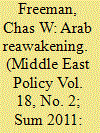

|
|
|
| 9 |
ID:
065454
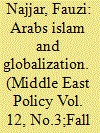

|
|
|
| 10 |
ID:
096621
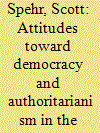

|
|
|
| 11 |
ID:
131909
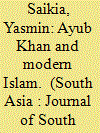

|
|
|
|
|
| Publication |
2014.
|
| Summary/Abstract |
Pakistan is viewed today as a haven for fundamentalist Islamists. This essay probes the genealogy of Pakistan's Islamisation by focusing on the rule of President Ayub Khan (1958-69) and extends to the war of 1971 and the dismembering of Pakistan during Yahya Khan's presidency. I trace Ayub Khan's project of 'modernising Islam and the nation' by probing three sites: the transformation of the Pakistani military into a jihadic army; the re-writing of history to craft an Islamic identity; and the reformation of East Pakistani Bengalis to make them 'good Muslim subjects'. Ayub Khan's experiment was a failure, leading to the violent dismembering of the country in 1971, yet an ethical imaginaire of renewing the commitment to creating a humanistic moral community continues to be an ongoing quest in Pakistan, as reflected in my investigations of the oral testimonies of war veterans. Fulfilling these ethical concerns requires critical evaluation of the roots of Islamisation in Pakistan, beginning from the period of Ayub Khan's presidency.
|
|
|
|
|
|
|
|
|
|
|
|
|
|
|
|
| 12 |
ID:
089105
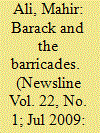

|
|
|
|
|
| Publication |
2009.
|
| Summary/Abstract |
Hopes that Barack Obama's presidency would lead to significant changes in the way the United States conducts itself in the Middle East were tempered by the realisation that numerous domestic and international considerations would prevent him from making a clean break with the past, even if he were so inclined.
|
|
|
|
|
|
|
|
|
|
|
|
|
|
|
|
| 13 |
ID:
115622
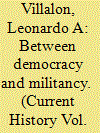

|
|
|
|
|
| Publication |
2012.
|
| Summary/Abstract |
The effort to try to distinguish between good and bad Muslim ideologies may be much less important than the need to support functional political institutions.
|
|
|
|
|
|
|
|
|
|
|
|
|
|
|
|
| 14 |
ID:
103302
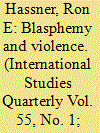

|
|
|
|
|
| Publication |
2011.
|
| Summary/Abstract |
Why did riots in response to the 2005 Danish cartoons depicting the Prophet Muhammad occur in nine Muslim states but not in 43 other states in which Muslims form a majority of the population? I show that the location of the cartoon riots is best explained by combining insights from the study of politics with arguments from the sociology of religion. Protests were mobilized by radical Islamist movements alarmed by the moral threat posed by the blasphemous cartoons. In states characterized by political rights and civil liberties, regimes responded haphazardly to the demonstrations, leading to confrontations between security forces and angry rioters. This finding can be generalized beyond the Muslim world: We should expect reactive religious violence wherever fundamentalist movements are confronted by transgressive acts, committed by threatening opponents, in a political environment that permits protest but fails to protect the religious principles of the movement.
|
|
|
|
|
|
|
|
|
|
|
|
|
|
|
|
| 15 |
ID:
119724
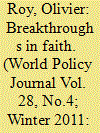

|
|
|
|
|
| Publication |
2011.
|
| Summary/Abstract |
Florence-Faith made a sudden breakthrough into contemporary global politics with the 1979 Islamic Revolution in Iran. From the Taliban to al-Qaida, the following three decades have been full of international tensions where faith was a leading factor, but this unease has by no means been restricted to the Muslim world. The Catholic Church found a new visibility under the leadership of John Paul II, shaking the communist grasp on Eastern Europe. Millions of converts from Catholicism to Protestantism are reshaping domestic politics in Brazil and other Latin America countries. Conversions from Islam to Christianity have created diplomatic hurdles in Malaysia and Afghanistan, while foreign missionary activities came under state scrutiny in India, Russia, and France. The Falun Gong sect waged an international campaign to pressure the Chinese government to remove a ban on the group. The affairs of Salman Rushdie and the Danish cartoons seemed to pit the Muslim world against the West, while the rise of Islam in Europe has raised anxieties in the United States and Israel, with the spectre of a looming Eurabia haunting urban neighborhoods and diplomatic corridors alike.
|
|
|
|
|
|
|
|
|
|
|
|
|
|
|
|
| 16 |
ID:
118865
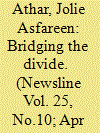

|
|
|
| 17 |
ID:
065402
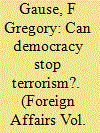

|
|
|
|
|
| Publication |
Sep-Oct 2005.
|
| Summary/Abstract |
The Bush administration contends that the push for democracy in the Muslim world will improve U.S. security. But this premise is faulty: there is no evidence that democracy reduces terrorism. Indeed, a democratic Middle East would probably result in Islamist governments unwilling to cooperate with Washington
|
|
|
|
|
|
|
|
|
|
|
|
|
|
|
|
| 18 |
ID:
156219
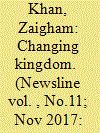

|
|
|
| 19 |
ID:
131477
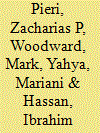

|
|
|
|
|
| Publication |
2014.
|
| Summary/Abstract |
This paper examines the concept of (public) sin as well as efforts to counteract sin from the perspective of Islam. The understanding that hisba, the prohibition of vice and enjoining of virtues, are a responsibility of both the state and the community is common in historical and contemporary Muslim societies. Where the state cannot or does not provide means for countering (public) sin, the perception for some Muslims is that the responsibility on the community and individuals to do so increases. Based on ethnographic research in Britain, Nigeria, Indonesia, Malaysia, and Singapore, the paper highlights examples of how sin has been defined amongst Muslim communities as well as the methods and rationales given to justify the forbidding of sin as a collective and communal public obligation. As the world becomes more integrated, there is growing concern amongst Muslim communities that sin is becoming the norm, leading society to degeneracy, that people who would not have otherwise sinned are influenced to do so. Common features in forbidding sin across Muslim communities have appeared, often focusing on what are seen as moral issues such as dress codes, music, gambling, alcohol, smoking, and the mixing of men and women in public. The forbidding of sin has resulted in attempts to introduce "Shari'a Zones" in some predominantly Muslim areas of London, whilst in Indonesia, this has given rise to the Islamic Defenders Front and in some Northern Nigerian states to the reintroduction of the criminal codes of the Shari'a.
|
|
|
|
|
|
|
|
|
|
|
|
|
|
|
|
| 20 |
ID:
131791
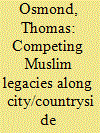

|
|
|
|
|
| Publication |
2014.
|
| Summary/Abstract |
Between the Middle East and Eastern Africa, the city of Harar is often considered as the main historical centre of Islam in Ethiopia and the Horn of Africa. Until recently, the cultural hegemony of the Muslim elites inhabiting Harar was commonly opposed to the almost pagan behaviours of the Oromo - or 'Galla' - farmers and cattle herders living in the wide rural vicinity of the town. The 1995 Constitution provided the different 'ethnolinguistic nationalities' of the new Ethiopian federation with the same institutional recognition. However, the institutionalisation of the two Harari and Oromo 'nationalities' seems to foster the historical duality between the city-dwellers and their close neighbours. This article proposes another political history of Harar and its ambivalent Oromo partners through the local dynamics of the Muslim city/countryside models. It reveals the both competing and complementary orders that have probably bound together the populations of Harar and its rural hinterland for more than five hundred years.
|
|
|
|
|
|
|
|
|
|
|
|
|
|
|
|
|
|
|
|
|